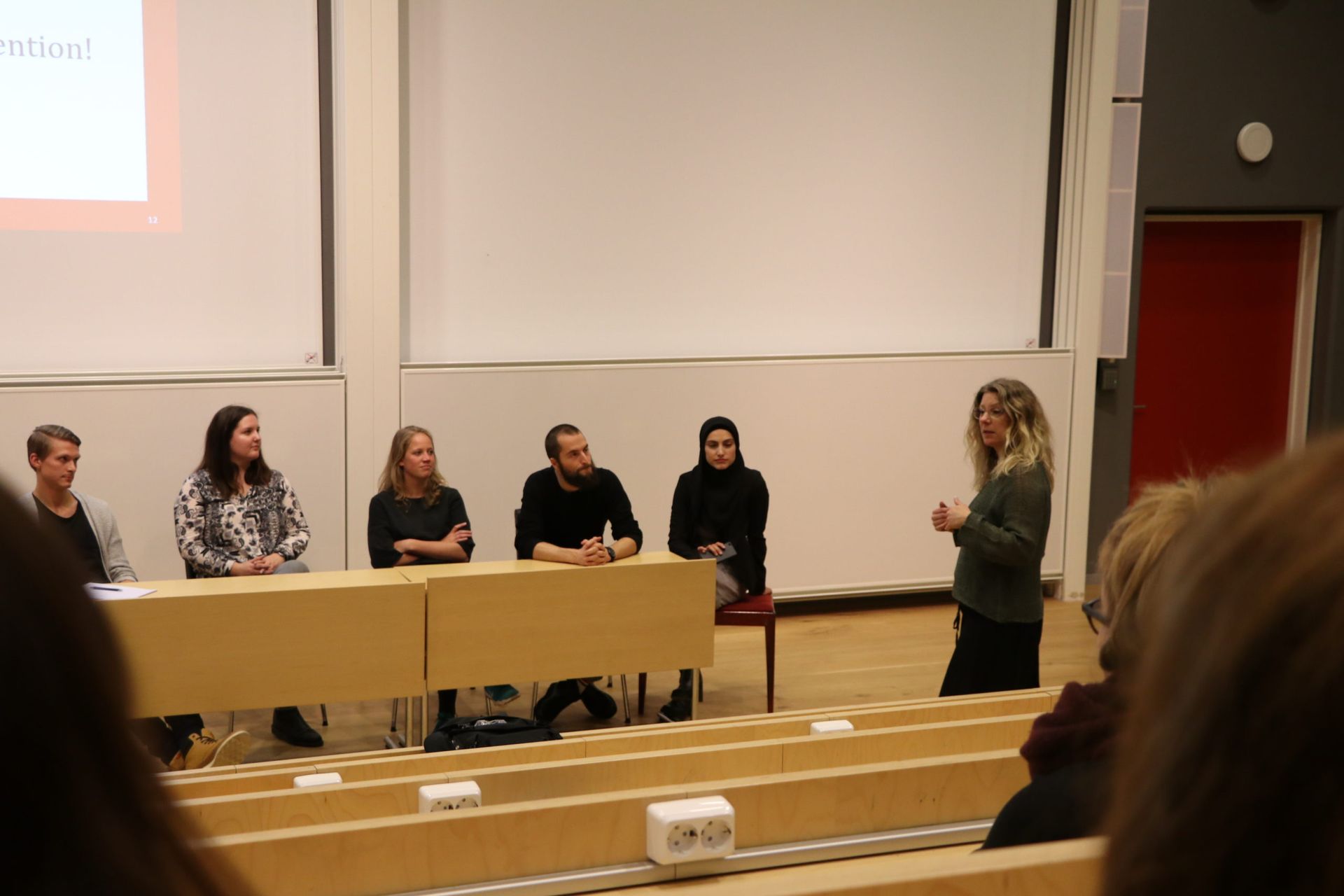
Written by Kelsey
14 Nov 2025
Are you planning to look for a part-time job or internship during your studies? Do you want to launch a career in Sweden one day? Here are 6 tips that might help you throughout your job search!
I’m by no means an expert on working in Sweden. But I recently attended Unimeet Gothenburg’s Career Day– a special event with seminars, workshops, and exhibitors tailored for international students. It was a great opportunity to meet employers and organizations looking for international talent, and to hear practical tips and advice from career coaches and international professionals. I attended 3 workshops about exploring your career path, networking and scaling influence, and tailoring your CV and cover letter to the Swedish market. Here’s what I learned:
1. Take Advantage of Career Resources (Lots of Options for Tech Specifically!)
If you’re studying a technological field, you’re in luck. At the event, essentially all the exhibitors were technological innovation companies. This makes sense, as Sweden is expected to need approximately 18,000 tech talents each year! If you’re interested in working for a tech company, you might find Switch to Sweden to be a helpful tool. This platform focuses on connecting international talent with tech companies in Sweden, using an innovative AI matchmaking tool. It pairs companies with students based on skills, motivations, and business needs, with over 300 successful matches so far. However, they are observing a mismatch in hard skills, as companies are seeking multidisciplinary talents and specialized knowledge. But you can use the platform to identify the skills tech companies are looking for, and put in effort into developing them.
I was disappointed to see a general lack of exhibitors and tailored career advice for social sciences at the event. I’m studying a mix of political science, environmental governance, and psychology. Given Sweden’s focus on sustainability, I was surprised that there weren’t any sustainability-related startups or companies at the Career Day. The most relevant organization was International House Gothenburg, which aims to help international talents settle into life in Sweden through events and informational resources. They offer Career Support services, where advisors provide practical advice and answer questions about the Swedish job market, CV options, and internship and job opportunities.
2. Do Your Homework – Research Companies
While it may sound obvious, it’s up to you to research companies in your field. Which ones do you find most interesting? What makes you curious about the company and its mission? Even if the company doesn’t have a job opening, you can always reach out to inquire about opportunities. This can be an effective strategy! Chris, a past Digital Ambassador with Study in Sweden, successfully secured an internship and a part-time job just by reaching out to a company via email! To learn more, read Ravi’s interview with Chris, where he shares his success story and job search advice.
This research is also helpful when crafting your CV and cover letter. Your application should show that you know the company, and that you’ll fit into the culture and team. You should spend some time identifying the company’s focus or problem they’re trying to solve, what they need, what they value, and who they are as a company. With a little bit of research, you can translate your experience into their language. Literally, you can pick up on key words they use to describe their work. Don’t go overboard, but you could use some of these words when creating your cover letter.
3. Learn Swedish Language and Culture
Speaking of language, knowing Swedish seems to be very important. The majority of jobs– both part- and full-time require Swedish fluency. While most Swedish people speak excellent English, Swedish is still an important part of creating cohesion within the team. Swedish is often the default language for meetings, internal communications, or even more informal conversations. But according to Hela Galvis– Project Manager at Switch to Sweden– making an active effort to learn Swedish was enough for her to get a job. In her workplace, everyone speaks Swedish constantly, and this immersion in the language was the best way to learn.
While your skills and qualifications might be important, you also need to be a good fit for the team and workplace culture. You can get a sense of this culture through research. Be yourself, but make sure to act within the norms of the workplace culture. For instance, being overly formal and using titles might be a sign of respect in your home country, while it may make employers uncomfortable here.
4. Do Some Self-Reflection. Think About Your Unique Skills, Personality, & Values
It’s also important to understand how your studies, cultural background, and experience make you unique. Being an international student can be an asset! Once you’ve found companies that interest you, think about what you bring to the table. How can you help them to accomplish their goals? What makes you stand out? Hard skills are certainly important for many jobs, but soft skills are just as crucial. Especially with the rise of AI, creative thinking, flexibility, curiosity, willingness to learn, and a cooperative spirit are valuable traits.
Also remember that you’re more than just your CV. You’re a person, with your own interests, values, and life outside of work! Especially with Sweden’s work-life balance approach, adding a personal and authentic touch to your application and interview process can be a good thing. And of course, hobbies are important for a fulfilling life here.
5. Network, Volunteer, and Build Community
When you come to Sweden, you’re leaving your network and community behind. With time, you’ll be able to build your own little community here. Hobbies are a great way to connect with other people over genuine interests. This makes life more fun, and can help you build a support system for the not-so-fun times. Basically, don’t be so focused on getting a job that you neglect your social life!
Building community can be personally meaningful, but also lead to professional opportunities. Kris Granger shared an inspiring story about how an acting class and volunteering eventually led to him landing his dream job at Volvo. For him, volunteering is a great way to give away our value to others. When you are generous with your time and talents, people will notice. To use his terminology, these people can become “amplifiers” who are empowered to speak positively on your behalf, and help you create more connections.
6. Learn How to Write Your CV & Cover Letters the Swedish Way
Swedish values like cooperation, collaboration, and equality should come through in your application materials. Swedish companies appreciate modesty, clarity and fact-based statements, self-reflection and inner motivation, teamwork instead of self-centeredness, and authenticity. You should show an awareness of how you can add value to the team through human connection, professional impact, and your larger sense of purpose.
In your cover letter, make sure to avoid simply repeating your CV. Instead, connect your skills and experiences to the role and the company. Isabelle Joneken, a career guidance counselor at International House Gothenburg, offered the helpful PARVIA framework for writing cover letters.
P – Purpose: describe the situation or challenge, providing context
A – Action: what you did, showing your initiative and contribution
R – Result: what happened as a result of your actions, especially concrete outcomes
V – Value: why it was valuable for you, but especially for others like your teammates or your organization
I – Insight: what you learned from the experience
A – Application: how you can use what you learned today, especially as it relates to the role
If you’re looking for some concrete examples of this advice in action, check out Nana’s blog about striking a balance– or as the Swedes would say, lagom– between humility and bragging in your CV.
My Takeaways
After hearing from the career guidance experts at Unimeet Gothenburg’s event, I felt a bit more prepared for a future job search. Presenters stressed the cooperative, collaborative, and collective values of Swedish society and industry. But you’re still a unique person, so take some time to self-reflect about your skillset and personality, and how you can fit into and provide value to the team. This is definitely good to keep in mind when crafting your application materials. And the advice gave me yet another reason to learn Swedish, since fluency opens up so many new opportunities.
And while getting a job might be challenging, there are so many resources available to help you! Take advantage of them. From organizations like Unimeet and International House Gothenburg to university career departments, there are plenty of people who are happy to assist if you just reach out. Good luck on your job search!





